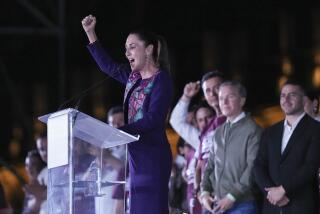And Now, AQUINO : A Purity in the Running, a Reality in the Presiding
- Share via
WASHINGTON — Back in 1963, the Kennedy Administration encouraged a group of dissident South Vietnamese generals to topple their president, Ngo Dinh Diem, whose inept and unpopular regime was failing to cope with a mounting communist insurgency. The episode marked a turning point for U.S. policy in Vietnam.
Now, the Reagan Administration has played an important part in ousting Philippine President Ferdinand E. Marcos and replacing him with Corazon Aquino. The U.S. move began on Feb. 15, when President Reagan, after zigzagging, bluntly blamed the Filipino leader for the “widespread fraud and violence” that marred the election a week before. It ended when Sen. Paul Laxalt (R-Nev.), on instructions from Reagan, advised a beleaguered and exhausted Marcos: “I think you should cut, and cut cleanly.”
The memory of the Diem coup had haunted U.S. officials as they pondered ways to depose Marcos, who was clearly headed toward collapse as a result of egregious mismanagement and corruption. They feared that, as in Vietnam after Diem, his downfall would plunge the Philippines into chaos and benefit communist-led rebels who call themselves the New People’s Army. Indeed, Reagan expressed that view in October, 1984, suggesting that Marcos, despite his faults, was the sole alternative to communism.
But the new concern is that the United States, having persuaded Marcos to step down, may have assumed responsibility for the Philippines’ future. That responsibility could take on critical dimensions should the communist threat grow--as in Vietnam. A senior U.S. diplomat, comparing the two situations, said to me: “In for a penny, in for a pound.”
The Vietnam and Philippine situations are not entirely analogous. By 1963, the United States had already established a long-term commitment to South Vietnam’s security--16,000 military advisers were then in the country. The only U.S. military personnel now in the Philippines, by contrast, are at Clark Air Field and the naval installations at Subic Bay, strategic bases unrelated to the fight against local communists. Diem’s domestic enemies were covert conspirators; Marcos’ foes fought in the open, by election.
But the departure of despots leaves a vacuum. Just as the Vietnamese generals fell to bickering among themselves, so Aquino will face the task of keeping intact a cohesive government that can grapple with the immense problems before the Philippines. America’s role in the years ahead may well hinge on her success.
I have known “Cory” Aquino since the days 20 years ago when her late husband, Benigno S. Aquino Jr., was one of the Philippines’ leading political figures. Arrested by Marcos in 1972, he spent eight years in jail, then went into exile in the United States. He returned to Manila in August, 1983, only to be assassinated at the airport--a crime in which Marcos was almost certainly implicated. The murder, sparking widespread opposition to Marcos, brought Cory to power. Never have I seen a person change so completely.
During her husband’s lifetime, Cory was a shy housewife and mother who quietly served coffee while he talked endlessly, with extraordinary verve, on nearly every topic imaginable. Shattered by his death, she resisted pleas to campaign against Marcos. “What do I know about being president?” she would repeat.
Gradually, though, she realized that only she could crystallize the opposition--and she did. Traveling with her during the campaign, I saw the modest woman transformed into a dynamic crusader--energetic, self-confident, sometimes witty, always projecting sincerity. A vital element in her performance was its spiritual component. Intensely religious, she was Joan of Arc struggling against evil. Filipinos, their Catholicism heavily mixed with mysticism, were inspired.
But if campaigning for office is a kind of poetry, managing a government is prose, and now Aquino must rebuild the plundered Philippine economy. She must also learn the art of politics, which requires making compromises. A key question is whether her original loyalists, attracted by her purity, will tolerate deals. Also in question is whether veteran politicians in her entourage will respect her authority.
During the campaign, her relations with running mate Salvador Laurel were often strained. Laurel, who only broke with Marcos in 1980, had himself hoped to run for president and only conceded to her when persuaded of the need for a unified front. Named prime minister in the new Cabinet, he will not be easy to control.
Even more controversial was Aquino’s appointment of Juan Ponce Enrile, the defense minister under Marcos, as her own defense minister--obviously because, at the last minute, he switched allegiance and brought several army units over to her side. Enrile made a huge personal fortune under Marcos; he closed his eyes to abuses in the armed forces and he retains considerable leverage over Aquino through the troops faithful to him.
A greater task for Aquino, however, is initiating drastic renovation of Philippine society, which in many aspects is feudal. Unless the country undergoes such a renovation, scant progress will be made in reducing the strength of the communists who have exploited the shocking disparities between rich and poor.
An estimated 70% of the country’s 54 million people live below the poverty line; their appalling plight is visible everywhere. On a visit to the island of Negros a few weeks ago, for example, I saw sugar plantation workers who earn less than $300 a year, their dwellings flimsy shacks without electricity or water.
Meanwhile, wealthy Filipinos display opulence without shame. They occupy luxurious houses, ride around in chauffeur-driven limousines and spend more on lunch than a peasant earns in a month. According to a recent World Bank study, the top 20% of the Philippine population accounts for 59% of the national income.
Aquino, aware of this, has pledged that she will use the president’s lavish Malacanang Palace only as an office and continue living in a rather simple villa on Manila’s outskirts. But the symbolic gesture will not do much to weaken the communists. The communist assertion that she belongs to the oligarchy has some credibility; her family’s sugar plantation is one of the largest in the Philippines.
The communists claim to have 12,000 armed guerrillas and some 5 million supporters operating in nearly all of the country’s 74 provinces. Experts reckon that they could easily increase the size of their force but would rather avoid logistical and organizational problems at the moment. In any case, their agents have told me, long-range strategy is to win by political means, creating a coalition with other disgruntled factions. They do not expect a takeover in less than a decade.
By urging followers to boycott the election, the communists indicated a preference for Marcos, whose excesses helped them to gain recruits and sympathizers. Thus Aquino’s triumph may have hurt them. But unless she acts quickly and decisively to revamp the country’s basic social and economic structure, their setback is only temporary.
The communists have so far refrained from threatening the U.S. air and naval bases, largely to avert a possible American military reaction. But it is only a matter of time before the bases are jeopardized, and then the United States must choose between protecting the installations or moving them.
To shift the bases would disrupt America’s strategic position from the Pacific to the Indian Ocean, and also alarm China, Japan and other Asian nations that perceive the region’s huge Soviet fleet as a menace. It would disappoint the Filipinos, most of whom count on the United States despite nationalistic barbs at America. But for the United States to intervene militarily in the Philippines would surely prompt the American public to recoil from “another Vietnam.”
The dilemma can be avoided if the new Philippine government headed by Aquino, with bigger doses of U.S. aid, moves swiftly to deal with the deep causes of social unrest. In short, Aquino will have to stage a revolution of her own to prevent a communist revolution. Having seen the influence exerted by the Reagan Administration in Marcos’s removal, Filipinos may expect the United States to resolve their problems--but ultimately, only Filipinos can determine their fate.
More to Read
Get the L.A. Times Politics newsletter
Deeply reported insights into legislation, politics and policy from Sacramento, Washington and beyond. In your inbox twice per week.
You may occasionally receive promotional content from the Los Angeles Times.










